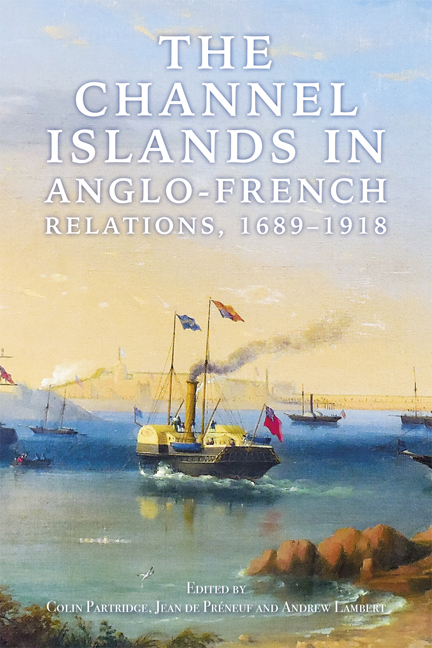Book contents
- Frontmatter
- Dedication
- Contents
- List of Illustrations
- List of Contributors
- Preface
- Introduction: ‘The Ehrenbreitstein of the English Channel’
- Part 1 Corsairs – the Ancien Régime and French Wars from 1689
- Part 2 The Islands – French and British Intelligence from the Seven Years War to 1815
- Part 3 Territorial Waters – the Land and Sea Interface from the 17th to 20th Centuries
- Part 4 Engineering Strategic Change
- Part 5 Alderney and the Channel Islands – Naval Strategy from 1815 to 1905
- Part 6 Civil Societies and Anglo-French Naval Rivalry – the 19th Century to WWI
- Part 7 Trade War – the Protection of Channel Islands Shipping in the Great War
- Afterword: Alderney, The Channel Islands, and the Study of History
- Bibliography
- Index
10 - Alderney: The Impact of National Defence
Published online by Cambridge University Press: 15 May 2024
- Frontmatter
- Dedication
- Contents
- List of Illustrations
- List of Contributors
- Preface
- Introduction: ‘The Ehrenbreitstein of the English Channel’
- Part 1 Corsairs – the Ancien Régime and French Wars from 1689
- Part 2 The Islands – French and British Intelligence from the Seven Years War to 1815
- Part 3 Territorial Waters – the Land and Sea Interface from the 17th to 20th Centuries
- Part 4 Engineering Strategic Change
- Part 5 Alderney and the Channel Islands – Naval Strategy from 1815 to 1905
- Part 6 Civil Societies and Anglo-French Naval Rivalry – the 19th Century to WWI
- Part 7 Trade War – the Protection of Channel Islands Shipping in the Great War
- Afterword: Alderney, The Channel Islands, and the Study of History
- Bibliography
- Index
Summary
The coastal landscape of Alderney is dominated by the relics of its former strategic maritime prominence – a prominence based on British naval planning of the mid-Victorian period which would transform the island over a critically brief interval of thirty years in the mid-nineteenth century. However, it would be misleading to suggest that this was the first and last occasion on which the Channel Islands archipelago would find itself in the front line of international conflict.
Islands in the front line
The idea that the Channel Islands – as we now call them – would provide an advanced station for English and British warships and a base from which to observe and intercept enemy shipping, may be truly said to have originated as far back as the thirteenth century after King John's loss of Normandy, but more recently – during the War of American Independence – the British government would support modest plans to improve the coast defences of the islands, and build major works at Fort Regent in Jersey and Fort George in Guernsey. At this time, and following French commitment to develop the port of Cherbourg, more serious attention would be given to the provision of improved harbour facilities in the three principal islands in order to secure military support and naval protection in time of war. The threat from France was real and ever-present: for instance, an attack by a French squadron on Elizabeth Castle and a foiled coup de main in St Ouen's Bay, Jersey, in 1779; the attempt by three French privateers to seize Alderney in 1780, and the defeat of Baron de Rullecourt's forces at the Battle of Jersey after a successful landing in 1781.
Fears of imminent attacks on the Channel Islands during the French Revolutionary and Napoleonic Wars were given renewed impetus after Napoleon's visit to Cherbourg in April 1803, relaunching Vauban's project of over a century earlier to create un port militaire, and appointing Joseph Cachin as Directeur des travaux maritimes. Writing to Lord Pelham, Lieutenant- Governor General Sir John Doyle urged: ‘Your Lordship knows we are the advanced posts and that the fate of these islands would have an influence upon publick opinion.’
- Type
- Chapter
- Information
- The Channel Islands in Anglo-French Relations, 1689-1918 , pp. 195 - 214Publisher: Boydell & BrewerPrint publication year: 2024



